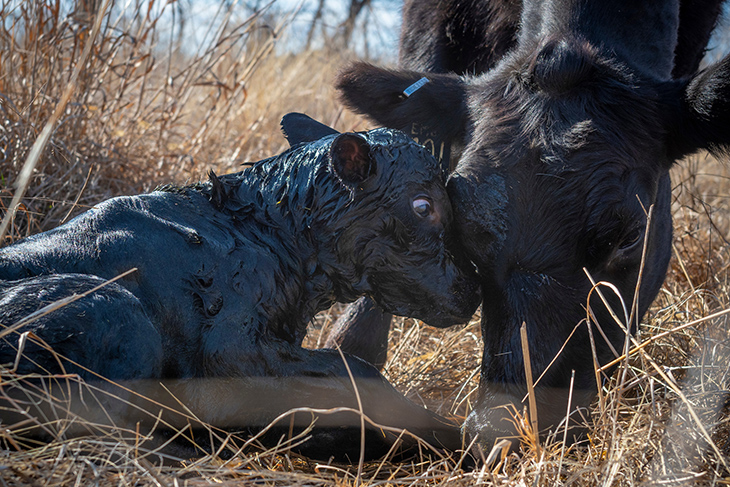
Source: Oklahoma State University | Jan. 21, 2021
Cow-calf operators who have not already stored several doses of colostrum or colostrum replacer should do so before the start of spring-calving season, said Barry Whitworth, Oklahoma State University Extension veterinarian and food animal quality and health specialist.
“Calves born after a difficult birth are at a high risk of failing to receive adequate colostrum by natural suckling because of greatly decreased colostrum intake,” Whitworth said.
Some calves born to a prolonged stage II of parturition – delivery through the pelvic canal – can suffer from severe respiratory acidosis. Such calves are less efficient at absorbing colostral immunoglobulins or antibodies even if artificially fed colostrum. The only disease protection baby calves will receive is from the passive transfer of antibodies from the colostrum they ingest. Colostrum also contains transferrin and lactoferrin, which bind iron and restrict bacterial growth. These factors, together with immunoglobulins, help limit growth of bacteria in the gut.
“Colostrum or colostrum replacer will need to be administered by bottle suckling or tube feeding,” Whitworth said. “The opportunity may exist to obtain natural colostrum from newly freshened dairy cows. Avoid obtaining colostrum from dairies known to have had an incidence of Johnes Disease – a contagious, chronic and often fatal infection that affects primarily the small intestine of ruminants.”
Previously obtained colostrum must be kept frozen to protect the integrity of the large protein molecules that make up the various immunoglobulins. Fresh colostrum can be stored in 1-quart doses by putting that much in a gallon-size Ziploc bag. Lay the bags flat to freeze in the freezer. When the time comes to thaw the colostrum and feed it to the newborn calf, place the Ziploc bag in warm water to quickly thaw it.
The amount of immunoglobulin ingested is a major factor in final blood immunoglobulin concentration and disease protection. A practical rule-of-thumb is to feed 5% to 6% of the calf’s body weight within the first six hours and repeat the feeding when the calf is about 12 hours old. For an 80-pound calf, this will equate to about 2 quarts of colostrum per feeding.
Commercial colostrum replacers contain more than 100 grams of immunoglobulin per dose. Always read the label before purchasing. It is important that producers not confuse supplements and replacers, Whitworth said. Supplements are used to boost antibody protection a calf gets from nursing and contain 40 to 60 grams of immunoglobulins, which is not enough to provide protection in a calf that has not nursed.
“Protection from colostrum is a time-critical event, so producers should ensure that calves get up and suckle. It is easy to miss newborn calves born in remote areas of pastures. This is particularly likely to happen if the cow remains lying down.” said Paul Beck, OSU Extension livestock specialist and holder of Oklahoma State’s Dennis and Marta White Endowed Chair in Animal Science.
Calves that miss getting timely colostrum ingestion are much more likely to suffer from calf scours, which can have lifelong effects on general hardiness and disease resistance.
Typically, studies indicate that a beef cow will mother its calf better than a dairy cow, and a cow will exhibit better maternal instincts than a heifer.
Research-based information about best calving management practices is available online, through all OSU Extension county offices and through the university’s popular Cow-Calf Corner Newsletter, delivered electronically and as a video segment on the weekly agricultural television show SUNUP.
